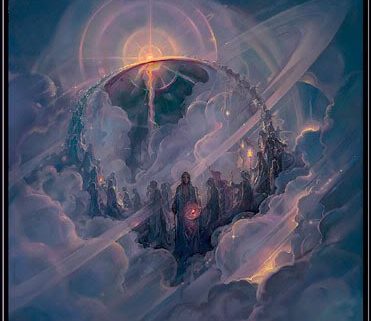I am Alpha and Omega, the beginning and the ending, saith the Lord, which is, and which was, and which is to come, the Almighty.
—Revelation 1:8
***
In the beginning God created the heaven and the earth. And the earth was without form, and void; and darkness was upon the face of the deep. And the Spirit of God moved upon the face of the waters.
—Genesis 1:1–2
***
Prepare slaughter for his children for the iniquity of their fathers;
that they do not rise, nor possess the land,
nor fill the face of the world with Watchers.
—Isaiah 14:21
***
And death and hell were cast into the lake of fire.
This is the second death.
—Revelation 20:4
The universe has always been planned. From beginning to ending, the Creator of all has known precisely what He would do, and when He would do it. And that even goes for the existence of sin, death, and resurrection. He’s foreseen rebellion, warfare, paganism, child abuse, thefts, and every dark thing done in every darkened place since the beginning of time itself. He is all-knowing, yet all-loving. He is the Father who stands at the end of the lane, watching for the return of His prodigal son. And you, dear reader—you are part of His wonderful plan. Each of us has a place in His design, and as of this moment, you’re reading this from a battlefield. Why, you ask? Because, the Lord of Hosts (Armies) has been marching to war since Genesis. That’s when the war started, and Revelation is when it ends. And it’s all about life and death.
The first action recorded in this ongoing war commenced just prior to Genesis 1:2. We cannot know for certain what happened, but a rebellion of some kind can be presumed. It is called the chaoskampf by scholars, and it’s a theme repeated throughout all civilizations and all cosmogonies.
The term is composed of two words: chaos and kampf. The first is Greek and refers to a state of disorder but also to a primordial god known as Chaos. Kampf is German for “war” or “struggle.”
Nearly every civilization has a mythology within its cosmogony that describes the subduing of a primordial “dragon.” The hero in these tales is the storm-god, and the villain is the monstrous god (sometimes goddess) of the sea:
Zeus subduing Typhon
Marduk destroying Tiamat
Baal clubbing Yam
Yahweh versus Leviathan
Thor taking out Jömungandr
Tarhunz defeating Illuyanka
Indra against Vritra
Yamata versus No Orochi (Japanese)
In all of these tales, the conquering hero uses a mace, a club, an ax, or another weapon to subdue the beast, but in the true version of events, YHWH only spoke. He then sealed the primordial dragon beneath the waves of the sea and placed His Holy Spirit upon it.
But if that was phase one of this long war, what comes next? In the Old Testament, we see YHWH again and again using the wiles of the enemy against them, turning their rituals on their heads as a means to foil their plots, and in the New Testament, Christ takes a claim made by the mighty men of old, the spirits of the Nephilim, those called the Rephaim, shades of the dead. These long-dead princes plan to rise again, when their leader calls them to life. It will take them three days to arrive, according to the ritual texts. Three days? It’s no coincidence that our Savior rose three days after the infernal realm killed Him.
We who watch for His return expect our Lord to set the world to rights, but the Fallen believe once again (foolishly) that they can circumvent that arrival by raising up their own army.
An army of the dead. It will be the ultimate zombie apocalypse, and these infernal demonic spirits will try to use humans as shields against the Almighty.
***
Human history began in a garden. Many of the myths and legends told by bards, storytellers, shamans, and priests through the ages originated with a dim, shared memory of a lost paradise. Much of the blood, sweat, and tears shed by mankind over the millennia has been in the service of gods who promised our ancestors a path back to that paradise.
The concept of “garden” has changed over time. Today, we think of a pleasant patch of earth for flowers, vegetables, fruit, or maybe herbs we can pick to spice up our cooking. It wasn’t that way in the beginning.
To really understand what God communicated through His prophets and apostles, we need to get inside the heads of the men who wrote the books of the Bible. Sadly, most of us don’t make much of an effort; it’s easier to read ourselves into the Bible than to put ourselves into the minds of people who lived two or three thousand years ago on the other side of the world. While it’s uplifting to read the story of, say, David and Goliath as a symbol for how God empowers us to slay the “giants” in our lives, it’s also a historic account of how David defeated the champion of an elite cult of pagan warriors who worshiped the dead.
Reading the Bible with the worldview of the ancient Hebrews takes a little work, but it’s worth it. The payoff is seeing the stories we’ve known since Sunday school through new eyes, almost as children reading them for the first time. It will bring a level of excitement to your study of God’s Word you haven’t felt in years, if ever, and it will instill a deep appreciation for what’s at stake in this long, supernatural war, and for God’s sacrifice to get you off the battlefield in one piece—and bring you back to where it all began—Eden.
The original garden wasn’t what we think of when we hear the word, and neither were the gardens in the days of the Hebrew prophets and apostles. There is a spiritual sense to the word that’s been lost over the years. Archaeologists who specialize in the ancient Near East—the lands we now call Israel, Jordan, Lebanon, Syria, and Iraq—have known this for some time. They know many things that haven’t been passed along to us in the pews, either because they don’t see the information through a biblical lens or because there just isn’t much interaction between professional scholars and us lay people.
We will dig deeper into this concept as we unpack the importance of the dead in the ancient world. Gardens held a special place in the culture of the ancient Near East, and it was part of a very different way of looking at the world. This wasn’t just because they lacked modern conveniences, our understanding of the sciences, and access to the Internet, but because they understood that the spirit realm was part of daily life—something we’ve lost in the modern world, especially in the West. Part and parcel of their reality was interacting with the dead.
The dead were gone only in the physical sense. It was understood that those who’d gone before had moved on to a different type of existence. It wasn’t necessarily enjoyable, and one’s happiness in the afterlife depended on his or her descendants performing the correct rituals every month.
The exception was the dead kings of old. They held a place of esteem in the afterlife, and the pagan kings of the ancient Near East aspired to join the ranks of their venerated fathers who could still affect the world of the living. To that end, special rituals were performed at special locations—and that brings us back to gardens.
This will make more sense as we dig into the beliefs and practices of the neighbors of ancient Israel. The significance of the cults of the dead will become clear, and you’ll see that the venerated dead are prophesied to play a role at Armageddon. The mother of all battles will be fought at the end of human history outside the walls around the Garden of God.
And the enemy host at the gates will literally be an army of the evil dead.

Derek Gilbert Bio
Derek P. Gilbert hosts SkyWatchTV, a Christian television program that airs on several national networks, the long-running interview podcast A View from the Bunker, and co-hosts SciFriday, a weekly television program that analyzes science news with his wife, author Sharon K. Gilbert.
Before joining SkyWatchTV in 2015, his secular broadcasting career spanned more than 25 years with stops at radio stations in Philadelphia, Saint Louis, Little Rock, and suburban Chicago.
Derek is a Christian, a husband and a father. He’s been a regular speaker at Bible prophecy conferences in recent years. Derek’s most recent book is The Great Inception: Satan’s PSYOPs from Eden to Armageddon. He has also published the novels The God Conspiracy and Iron Dragons, and he’s a contributing author to the nonfiction anthologies God’s Ghostbusters, Blood on the Altar, I Predict: What 12 Global Experts Believe You Will See by 2025, and When Once We Were a Nation.





Leave a Reply
Want to join the discussion?Feel free to contribute!